CCNA – IP Routing Questions 2
Here you will find answers to IP Routing Questions – Part 2
Question 1
Refer to the exhibit. Host A is to send data to Host B. How will Router1 handle the data frame received from Host A? (Choose three)
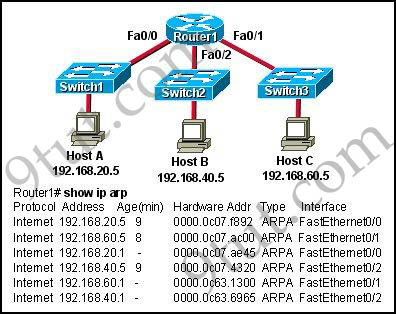
A. Router1 will strip off the source MAC address and replace it with the MAC address on the forwarding FastEthernet interface.
B. Router1 will strip off the source IP address and replace it with the IP address on the forwarding FastEthernet interface.
C. Router1 will strip off the destination MAC address and replace it with the MAC address of Host B.
D. Router1 will strip off the destination IP address and replace it with the IP address of Host B.
E. Router1 will forward the data frame out interface FastEthernet0/1.
F. Router1 will forward the data frame out interface FastEthernet0/2.
Answer: A C F
Explanation
While transferring data through many different networks, the source and destination IP addresses are not changed. Only the source and destination MAC addresses are changed. So in this case, Host A will use the IP address of Host B and the MAC address of Fa0/0 interface to send data. When the router receives this data, it replaces the source MAC address with it own Fa0/2 interface’s MAC address and replaces the destination MAC address with Host B’s MAC address before sending to Host B -> A, C and F are correct.
Question 2
What is an appropriate use of a default route?
A. to provide routing to a local web server
B. to provide routing from an ISP to a stub network
C. to provide routing that will override the configured dynamic routing protocol
D. to provide routing to a destination that is not specified in the routing table and which is outside the local network
Answer: D
Explanation
Default routes are used to direct packets addressed to networks not explicitly listed in the routing table. An example of default route is:
Router(config)#ip route 0.0.0.0 0.0.0.0 192.168.1.1
(Notice that the network address of default route is 0.0.0.0 0.0.0.0)
Question 3
A medium-sized company has a Class C IP address. It has two Cisco routers and one non-Cisco router.
All three routers are using RIP version 1.
The company network is using the block of 198.133.219.0/24.
The company has decided it would be a good idea to split the network into three smaller subnets and create the option of conserving addresses with VLSM.
What is the best course of action if the company wants to have 40 hosts in each of the three subnets?
A. Convert all the routers to EIGRP and use 198.133.219.32/27, 198.133.219.64/27, and 198.133.219.92/27 as the new subnetworks.
B. Maintain the use of RIP version 1 and use 198.133.219.32/27, 198.133.219.64/27, and 198.133.219.92/27 as the new subnetworks.
C. Convert all the routers to EIGRP and use 198.133.219.64/26, 198.133.219.128/26, and 198.133.219.192/26 as the new subnetworks.
D. Convert all the routers to RIP version 2 and use 198.133.219.64/26, 198.133.219.128/26, and 198.133.219.192/26 as the new subnetworks.
E. Convert all the routers to OSPF and use 198.133.219.16/28, 198.133.219.32/28, and 198.133.219.48/28 as the new subnetworks.
F. Convert all the routers to static routes and use 198.133.219.16/28, 198.133.219.32/28, and 198.133.219.48/28 as the new subnetworks.
Answer: D
Explanation
RIP version 1 does not support VLSM so we have to convert into RIPv2, OSPF or EIGRP -> B is not correct.
But EIGRP is a Cisco-proprietary routing protocol so it can not be used in a non-Cisco router -> A and C are not correct.
To support 40 hosts per subnet we need a subnet mask of /26 or lower (which leaves 6 bits 0 and 26 = 64 > 40 hosts). Therefore a subnet mask of /28 is not suitable in this case -> E & F are not correct.
Question 4
Refer to the exhibit. Which command will created a default route on RouterB to reach all networks beyond RouterA?
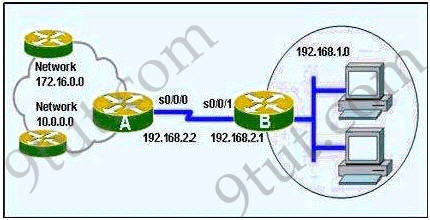
A. ip route 0.0.0.0 0.0.0.0 192.168.2.2
B. ip route 192.168.1.0 255.255.255.0 192.168.2.1
C. ip route 192.168.1.0 255.255.255.0 s0/0/0
D. ip route 10:0.0.0 255.255.255.0 s0/0/0
E. ip route 0.0.0.0 255.255.255.0 192.168.2.2
Answer: A
Explanation
Notice that in the static (or default) route we need to specify the exit-interface (local on that router) or the next-hop IP address (of a directly connected router) -> A is correct.
Question 5
Refer to the exhibit. S0/0 on R1 is configured as a multipoint interface to communicate with R2 and R3 in the hub-and-spoke Frame Relay topology. While testing this configuration, a technician notes that pings are successfully from hosts on the 172.16.1.0/24 network to hosts on both the 172.16.2.0/25 and 172.16.0.2.128/25 networks. However, pings between hosts on the 172.16.2.0/25 and 172.16.2.128/25 network are not successful. What could explain this connectivity problem?
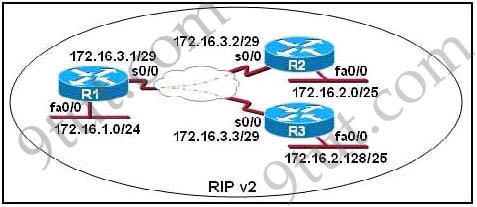
A. The ip subnet-zero command has been issued on the R1 router.
B. The RIPv2 dynamic routing protocol cannot be used across a Frame Relay network.
C. Split horizon is preventing R2 from learning about the R3 networks and R3 from learning about R2 networks.
D. The 172.16.2.0/25 and 172.16.2.128/25 networks are overlapping networks that can be seen by R1, but not between R2 and R3.
E. The 172.16.3.0/29 network used on the Frame Relay links is creating a discontiguous network between the R2 and R3 router subnetworks.
Answer: C
Explanation
The split horizon rule states “a router never sends information about a route back in same direction which is original information came”. In this case it means whenR3 sends update to R1 via s0/0, R1 does not send any update for same network out of interface s0/0. To solve this problem we can configure sub-interfaces on s0/0 or explicitly allow the update to be sent back on the same interface.
Question 6
S0/0 on R1 is configured as a multipoint interface to communicate with R2 and R3 in the hub-and-spoke Frame Relay topology shown in the exhibit. Originally, static routes were configured between these routers to successfully route traffic between the attached networks. What will need to be done in order to use RIPv2 in place of the static routes?

A. Configure the no ip subnet-zero command on R1, R2, and R3.
B. Dynamic routing protocols such as RIPv2 cannot be used across Frame Relay networks.
C. Configure the S0/0 interface on R1 as two subinterfaces and configure point-to-point links to R2 and R3.
D. Change the 172.16.2.0/25 and 172.16.2.128/25 subnetworks so that at least two bits are borrowed from the last octet.
E. Change the network address configuration to eliminate the discontiguous 172.16.2.0/25 and 172.16.2.128/25 subnetwork.
Answer: C
Explanation
Same as Question 5
Question 7
Refer to the exhibit. A network associate has configured the internetwork that is shown in the exhibit, but has failed to configure routing properly.

Which configuration will allow the hosts on the Branch LAN to access resources on the HQ LAN with the least impact on router processing and WAN bandwidth?
A.
HQ(config)# ip route 192.168.1.0 255.255.255.0 192.168.2.5
Branch(config) # ip route 172.16.25.0 255.255.255.0 192.168.2.6
B.
HQ(config)# router rip
HQ(config-router)# network 192.168.2.0
HQ(config-router)# network 172.16.0.0
Branch(config)# router rip
Branch(config-router) # network 192.168.1.0
Branch(config-router)# network 192.168.2.0
C.
HQ(config)# router eigrp 56
HQ(config-router)# network 192.168.2.4
HQ(config-router)# network 172.16.25.0
Branch(config)# router eigrp 56
Branch(config-router)# network 192.168.1.0
Branch(config-router) # network 192.168.2.4
D.
HQ(config)# router ospf 1
HQ(config-router)# network 192.168.2.4 0.0.0.3 area 0
HQ(config-router)# network 172.16.25.0 0.0.0.255 area 0
Branch(config)# router ospf 1
Branch(config-router)# network 192.168.1.0 0.0.0.255 area 0
Answer: A
Explanation
By configuring static route, we can minimize the router processing and WAN bandwidth.
Question 8
Refer to the exhibit. The network administrator requires easy configuration options and minimal routing protocol traffic. Which two options provide adequate routing table information for traffic that passes between the two routers and satisfy the requests of the network administrator?(choose two)
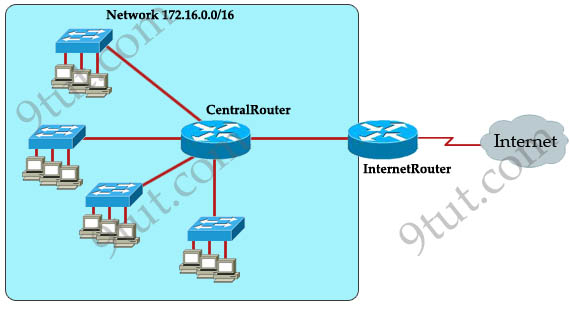
A. a dynamic routing protocol on InternetRouter to advertise summarized routers to CentralRouter.
B. a dynamic routing protocol on CentralRouter to advertise summarized routers to InternetRouter.
C. a static route on InternetRouter to direct traffic that is destined for 172.16.0.0/16 to CentralRouter.
D. a dynamic routing protocol on InternetRouter to advertise all routes to CentralRouer.
E. a dynamic routing protocol on CentralRouer to advertise all routes to InternetRouter
F. a static, default route on CentralRouter that directs traffic to InternetRouter.
Answer: C F
Question 9
A router receives information about network 192.168.10.0/24 from multiple sources. What will the router consider the most reliable information about the path to that network?
A. an OSPF update for network 192.168.0.0/16
B. a static router to network 192.168.10.0/24
C. a static router to network 192.168.10.0/24 with a local serial interface configured as the next hop
D. a RIP update for network 192.168.10.0/24
E. a directly connected interface with an address of 192.168.10.254/24
F. a default route with a next hop address of 192.168.10.1
Answer: E
Question 10
Which parameter can be tuned to affect the selection of a static route as a backup when a dynamic protocol is also being used?
A. link bandwidth
B. hop count
C. link cost
D. administrative distance
E. link delay
Answer: D
Question 11
Which statement is true, as relates to classful or classless routing?
A. RIPV1 and OSPF are classless routing protocols.
B. Classful routing protocols send the subnet mask in routing updates.
C. Automatic summarization at classful boundaries can cause problems on discontiguous networks.
D. EIGRP and OSPF are classful routing protocols and summarize routes by default.
Answer: C
Question 12
Which two are advantages of static routing when compared to dynamic routing? (choose two)
A. Security increases because only the network administrator may change the routing tables.
B. Configuration complexity decreases as network size increases.
C. Routing updates are automatically sent to neighbors.
D. Route summarization is computed automatically by the router.
E. Routing traffic load is reduced when used in stub network links.
F. An efficient algorithm is used to build routing tables using automatic updates.
G. Routing tables adapt automatically to topology changes.
Answer: A E
Question 13
The speed of all serial links is E1 and the speed of the all other links is 100Mb/s. A static route will be established on the Manchester router to direct traffic toward to the internet over the most direct path available. What configuration of the Manchester router will establish a route toward to the internet for traffic from workstation on the Manchester LAN?
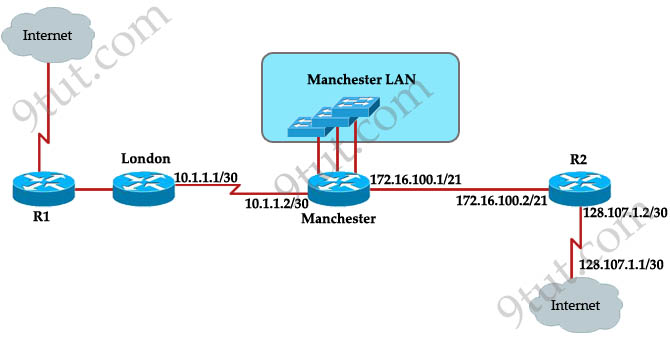
A. ip route 0.0.0.0 255.255.255.0 172.16.100.2
B. ip route 0.0.0.0 255.255.255.252 128.107.1.1
C. ip route 0.0.0.0 0.0.0.0 128.107.1.1
D. ip route 0.0.0.00.0:0:0 172.16.100.1
E. ip route 0.0.0.0 255.255.255.255 172.16.100.2
F. ip route 0.0.0.0 0.0.0.0 172.16.100.2
Answer: F
Explanation
Maybe “the most direct path available” here means via R2 because it is directly connected with the Internet while the London path needs to go through R1. So we need a command to send traffic to R2 and the correct command is “ip route 0.0.0.0 0.0.0.0 172.16.100.2″.



thanks 9 tut pass ccna exam 1000/1000 hurray
Valid Que :D
Q:12
Q:13
@nish can you give some tips.. what are the simulations that comes up in the exam?
hey @@@@@nish will you please help me? send me latest dumps at usman.basharat@hotmail.com
also help me with the simulations in the exam.i;m waiting for your reply.
Question 12 on CCNA 2nd try today
@9tut
Question 5
Explanation Wrong!
Split Horizon Preventing R1(s0/0) from sending route information back to that same interface, where from he learned the route information. In our case interface s0/0. Please correct me, if i’m wrong!
Thanking You
explanation is perfect. my fault!
Q 13 was on today’s exam
Q12 in today exam
I know this is going to seem silly. But I have missed every question that deals with routing tables such as question 44 on composite quiz 4. It gives an IP address that matches more than 1 routing table entry and ask where it is going. What are the rules because I am missing something in my thought process.
Thanks
Thanxs for help………..
I am going to give the CCNA exam with in few days. and Starting my carrier in this networking field…….
can someone please send me the latest dump doncasta8@yahoo.com Thank you
Please please please guys i am preparing for the exam next month, can someone be kind enough to send me the latest dumps on my e-mail : mastermalganis@hotmail.com
tomorrow is my day men………….!
Pliz i will sit for the exam next month, can someone send me the latest dumps on email: olesimbe@yahoo.com
Pliz i will sit for the exam next month, can someone send me the latest dumps on email: syedzohaib1@hotmail.com
Please guys i am preparing for the exam this month, can someone be kind enough to send me the latest dumps on my e-mail: aeneh@yahoo.com
ya they’ll send em for a price.
Can someone tell me where Composite quiz is?
q13 in exam today
Srry, but for correct sentence for Answer a is:
HQ#ip route 172.16.25.0 255.255.255.0 192.168.2.5
Branch#ip route 192.168.1.0 255.255.255.0 192.168.2.6
thanks
@Question 7. As I understand, you cant answer
HQ#ip route 172.16.25.0 255.255.255.0 192.168.2.5 since HQ router knows about 172.16.25.0 network, since it’s connected directly on Fa0/1, and the question is to save router processing to get access over resources at BR router on 192.168.1.0
Please let me know if I am wrong.
Cheers.
Q.12
please explain about stub network .
iam giving the ccna exam 0n 13th august 2013 .any one have good suggestions for me.usman
on Question 3, the explanation says it required 40 hosts. how was it calculated when it only gave the network and also the 3 routers.
can anybody help on this one? thanks.
What is the best course of action if the company wants to have 40 hosts in each of the three subnets?
IN CLASS C, /26 represent 255.255.255.192 it has 4 SN and 62 usable host in each SN.
0—————–63
64—————-127
128—————191
192—————255
256
@tweba,
thanks. should have read the question properly.
thank you 9tuts i passed ccna yesterday 933
please send me any latest dumps as i will be seating for exam in 2 weeks time,
email ID : rajcool_86@yahoo.com
Please I will be taking my CCNA exam by next week can someone help me with the latest dump email: uzorjeremiah@yahoo.com
Thank you…
Hello Guys I hope you will be fine there. I have CCNA (640-802) and CCNA security (640-554) Vouchers on special discount of 58% for World wide, with six months expiry date till you purchase. Each voucher cost 70USD.
Details Required For CCNA Voucher For Discount Processing:
1-Full Name. 1st Name & Last Name (as you want to appear on certificate & documents)
2-Country.
3-City.
4-State.
5-Pin Code (or Area Code)
6-Residential Address (or where you can collect your Certificate or further correspondence
can be received)
7-Date of birth
Add me on Skype through this information which is written below:
Skype Name: rockon660
you can also email me at this email address which is written below:
madeelqaiser@gmail.com
If you have any Questions feel free to contact me.
Thanks,
Best regards,
Adeel
When I do a config and type -
R3#copy running-config startup-config
I get this -
Destination filename [startup-config]?
Do I just press enter to save?
q3..Yes the question specifies the use of vlsm….but if u see the subnets in option b..they are all of the same length(/27)…and ripv1 supports only fixed length subnets..so why isin’t option b correct?
@ABC, RIPv1 does not support VLSM instead of RIPv2, that’s why we have to use v2. Maybe you meant “fixed length subnets” as classful routing (masks /8, /16 and /24). Hope it helps…
Ques on Aug 31, Saving Config – YES press enter to save to startup-config UNLESS you want to save to a different file.
**It’s a Rubicon**
Please guys i am preparing for the exam this month, can someone be kind enough to send me the latest dumps on my e-mail:
Thanks 9tut. I made it. I passed my CCNA 200-120 today. The sim is Access-list 1 , Access-list 2 & EIGRP. A lot of new questions like Netflow, Syslog, SNMP, VRRP, and GLBP.
Alhamdulilah.
Today i make it, passed CCNA 640-802 with 907/1000.
Goold Luck to All.
@ loi Aug 20 – Given 40 host. How do we get a min or 40 host? 2 to the power 6 minus 2. We get 64-2=62. If we tried 2 power 5 minus 2 we get 32-2 = 30 host. So 30 is not enough to support the network. We now know we borrowed 6 zeros, so this becomes (32-6) = \26 Now 26 is 11111111.11111111.11111111.11000000 = 192. Block size is 256-192 gives us 64. From the the choices we see only C and D supports \26. Tweba also explained it, maybe even better.
which latest dumps do you guys need??? I passed with a score of 986 today, study eigrp, extended access lists, vtp and dumbs from examcollection and 9tut. this is enough to pass this exam even if you don’t have any book. having said that this exam is a piece of cake if you are serious with your preparation. good luck to all of you guys. even though I also used cbt nugget, tod lammle, and testout.
hi joka,
can you tell about simulators
Guys help here I been studying CCNA but is lots of work I hav short time, I am writing next week should I do only questions?